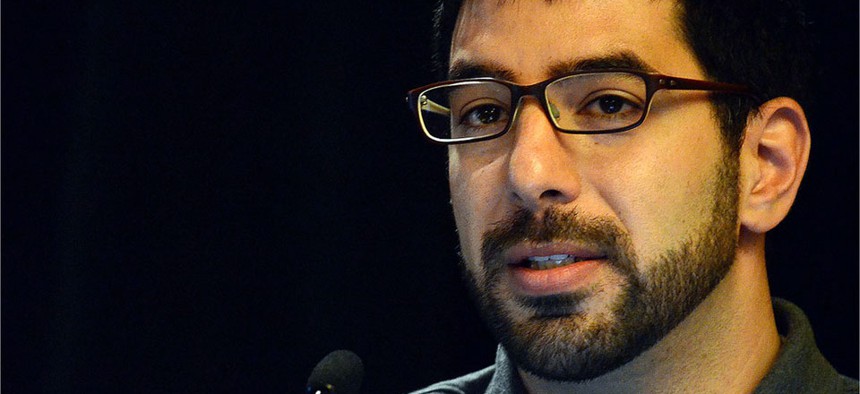Meet FTC's Chief Geek

Flickr user LunaWeb
Ashkan Soltani is the new chief technologist at the Federal Trade Commission—the tech industry's biggest privacy watchdog.
Ashkan Soltani is used to being what he calls the "geek" in the room. After six years in Washington as a privacy and security researcher, he's accustomed to being the IT ambassador to the Land of Lawyers in the tech-policy world. Still, he says, he wouldn't mind a bit of company.
In November, Soltani became the new chief technologist at the Federal Trade Commission—the tech industry's biggest privacy watchdog—which uses its power to enforce the prohibition against "unfair or deceptive practices" to ensure that companies are protecting consumers' information in the way they've promised. Soltani now advises Chairwoman Edith Ramirez on issues such as the explosion of data resulting from new technologies—and the perils that come along with it—but for most of his career he has been as hands-on as a car mechanic, getting up close and personal with computer code and data flows to understand what's going on and to determine whether the IT matches up with what companies say their privacy practices are.
Soltani says there are not many people in Washington—maybe "a handful"—who can do what he does, and one of his main goals at the FTC is to change that. Instead of doing all the work himself, he says, he wants to build a "hacker" culture within the agency, so it can more effectively carry out its oversight mission.
"What we need is more of a technical literacy in this space," he explains. "Right—this idea of a kind of an attitude of tinker or hacker. And not hacker in, like, the Blackhat movie, but hacker in a, like, 'Look, I don't know how this thing works, but I am going to take it apart and poke at it, and I am not really afraid of it.' "
Technology is at the top of the consumer protection agency's agenda as it enters its 100th year, and Soltani hopes not only to teach the lawyers a thing or two about code, but also to make the agency's culture—and, ultimately, Washington's culture—more welcoming to others like him.
On the day I meet him at his Pennsylvania Avenue office, Soltani has spurned the standard suit and tie in favor of jeans and blue sneakers that fall far outside the Lawyerland dress code. In order to draw the right people, he says, you need to compete with other places that offer very enticing lifestyles.
"If you go to California and [tell] someone: 'You can come to work in a suit and tie in a stuffy office—or you can do the same work in shorts and flip-flops with a foosball table right next to you and free food,' " Soltani says, "most people are like, 'I'm going to hang out in California.' "
Most people, but not Soltani. A California native himself, he traded sunshine and beaches for the swampy city because he grew tired of feeling like all the news had been made by the time he woke up on the West Coast, he says. He has never been much for waiting around: By the time he was in high school, he was already setting up computer networks for major companies in Los Angeles.
Over lunch, Soltani, who just celebrated his 40th birthday, explains that the actual methods of his work have not changed much since he first started researching online tracking as a master's student at UC Berkeley's School of Information. What have changed are the technologies and the scope of their impact. The explosion of mobile devices and the "Internet of Things" mean private companies and advertisers have more information about their customers than ever before.
In 2000, Pew Research estimated that only 25 percent of Americans accessed the Internet on their mobile devices. Today, nearly 60 percent of Americans have smartphones. That means a lot of cool innovation is going on in areas like commerce, health, and education, but it also means there is an even bigger chance consumers' data could land in the wrong hands. And privacy laws, Soltani says, are not keeping up, so there are few rules about how companies must treat and protect private data—ranging from email addresses to health records.
Few in Washington understand the phenomenon and its implications quite as directly as Soltani does. His first job in Washington was as a staff technologist at the FTC, where he helped with major investigations into Google's, Facebook's, and Twitter's privacy practices. Then, he helped produce The Wall Street Journal's "What They Know" series, investigating surveillance and new technologies, before joining The Washington Post, where he was a key player in the newspaper's Pulitzer Prize-winning reporting on the National Security Agency spying revelations.
Soltani says he's most proud of teaching journalists to do the research themselves. He says it's not magic, and most anyone can do what he does if they know where to look. Although he has the help of a few data forensic tools, anyone can access the code behind the Internet.
"It's really not that scary. It's just common sense," he insists. "In some of their key stories, the reporters themselves figured out the technology." Now, he's hoping that those in Washington's tech-policy world will follow suit.






